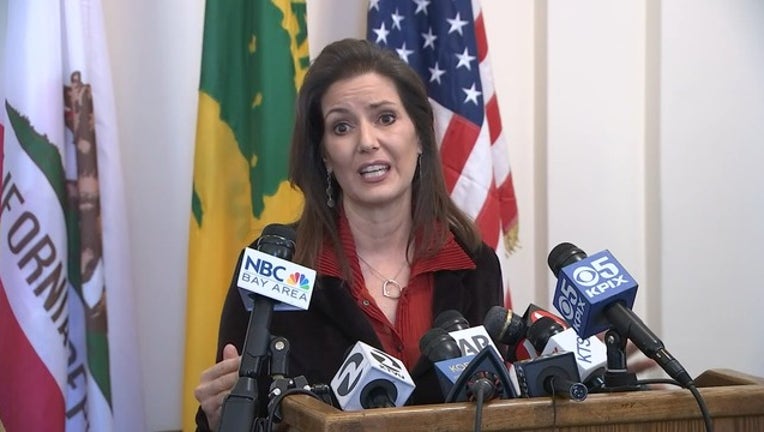Schaaf faces well-known progressive candidates in mayor's race

Oakland mayor Libby Schaaf says "how dare you" to Attorney General Jeff Sessions after he criticized her for warning the public about an ICE operation. March 7, 2018
OAKLAND (BCN) Oakland Mayor Libby Schaaf would be considered very liberal in most parts of the country, but in the Nov. 6 election she's being challenged by two well-known progressive candidates who say her policies aren't liberal enough.
One of Schaaf's opponents in the 10-candidate race is Cat Brooks, a nonprofit executive director who's best known as a leader of the activist group the Anti Police-Terror Project, which describes itself as "a coalition that seeks to build a replicable and sustainable model to eradicate police terror in communities of color."
In an interview, Brooks said, "My whole life isn't restricted to being an activist" and she's seeking the mayor's job because "hundreds of Oaklanders asked me to run."
In her campaign statement, Brooks said, "In these times, it's rational to demand radical change, to expect that everyone is housed, that teachers can afford to live where they teach, that police departments are transparent and accountable, that we have clean air and water and Oakland
works for everyone."
Another high-profile challenger is Pamela Price, a civil rights attorney who unsuccessfully ran against Alameda County District Attorney Nancy O'Malley in the June election but did better than many people expected.
Although O'Malley won with nearly 60 percent of the vote in the countywide race, Price said she "won" Oakland with 55 percent of the vote in the city and the support she received "shows people want change and are tired of the status quo."
Price said she's running for mayor "because our city is broken" and "Oakland is at a crossroads."
Price said if she's elected, she will focus on fixing Oakland's homeless crisis, provide affordable housing, deliver good-paying jobs, support small businesses and hold bad police officers accountable.
Schaaf's term as mayor, which began in January 2015, includes accomplishments such as dramatic decreases in gun homicides and gang-involved shootings and increases in getting more black and Latinx students into college through her Oakland Promise initiative.
However, it has also been marred by a sexual exploitation scandal involving the city's Police Department, as well as the Ghost Ship warehouse fire in 2016 that claimed 36 lives.
Schaaf said she's running for a second term because "I want to finish the job I started."
She said, "Oakland's problems are complex and many of the solutions are just starting to take hold and I'd like to seem them come to fruition."
Schaaf said she's "passionate" about solving homelessness, one of Oakland's biggest problems, and she's trying to do that by preventing people from falling into homelessness in the first place and building more permanent affordable housing.
There's a construction boom in downtown Oakland but Schaaf didn't take credit for it when she was interviewed, saying, "Much of the construction was well underway before me."
Instead, Schaaf emphasized that under her leadership the city passed its first impact fees, which require developers to include affordable housing in new projects or else pay to build affordable housing elsewhere in the city.
She also said she wants to strengthen protections for renters.
Schaaf received national attention after President Donald Trump criticized her for warning the public about immigration sweeps in February, but Brooks and Price allege that she isn't doing enough to keep Oakland a sanctuary city and protect immigrants.
Price said Schaaf shouldn't have allowed Oakland police to cooperate with a raid by federal Immigration and Customs Enforcement officials in 2017.
Price said, "The mayor is not doing enough for our immigrant population" and the city should do more to stop wage theft and economic exploitation of immigrants.
Brooks also said Oakland shouldn't cooperate with ICE and should be made "a sanctuary for black and brown people from police violence."
It might appear that Price and Brooks could be decreasing their chances of winning by targeting the same progressive voters who don't want Schaaf to be re-elected, but Price said, "The beauty of Oakland's ranked-choice voting system is that it allows candidates to challenge well-entrenched incumbents" such as Schaaf by listing three candidates on their ballots.
If no candidate wins a majority of first-choice votes in the first round of balloting, then second-preference and third-preference votes are tabulated until a candidate wins an outright majority.
Price says she encourages Oakland voters to list her number one and Brooks number two.
Price said, "I think I have a very good chance of winning" and
"I'm very well prepared to lead this city in this moment."
Brooks said she asks people to list her first and Price second and then list another progressive candidate as their third choice.
Brooks said she won't out-fundraise Schaaf but she thinks she has a chance to win because "we will out-organize her."
Brooks says, "We have 700 people knocking on doors and making calls, mobilizing people for the polls."
Schaaf said she supports the ranked-choice voting system and isn't concerned that Price and Brooks are asking people to vote for both of them.
"My job is to convince voters I'm the best choice so they'd like to keep me doing this job for another four years," she said.
Also running for mayor are Peter Yuan Liu, a retired military member, life insurance specialist Marchon Tatmon, Nancy Sidebotham, who unsuccessfully ran for mayor in 2014 and has had seven unsuccessful City Council campaigns, Saied Karamooz, the chief operating officer of Blue Beautifly, a skin and hair treatment company, Jesse A.J. Smith, whose main issue is radical police reform, swim coach and electronics integrator Cedric Troupe and project manager Ken Houston.

